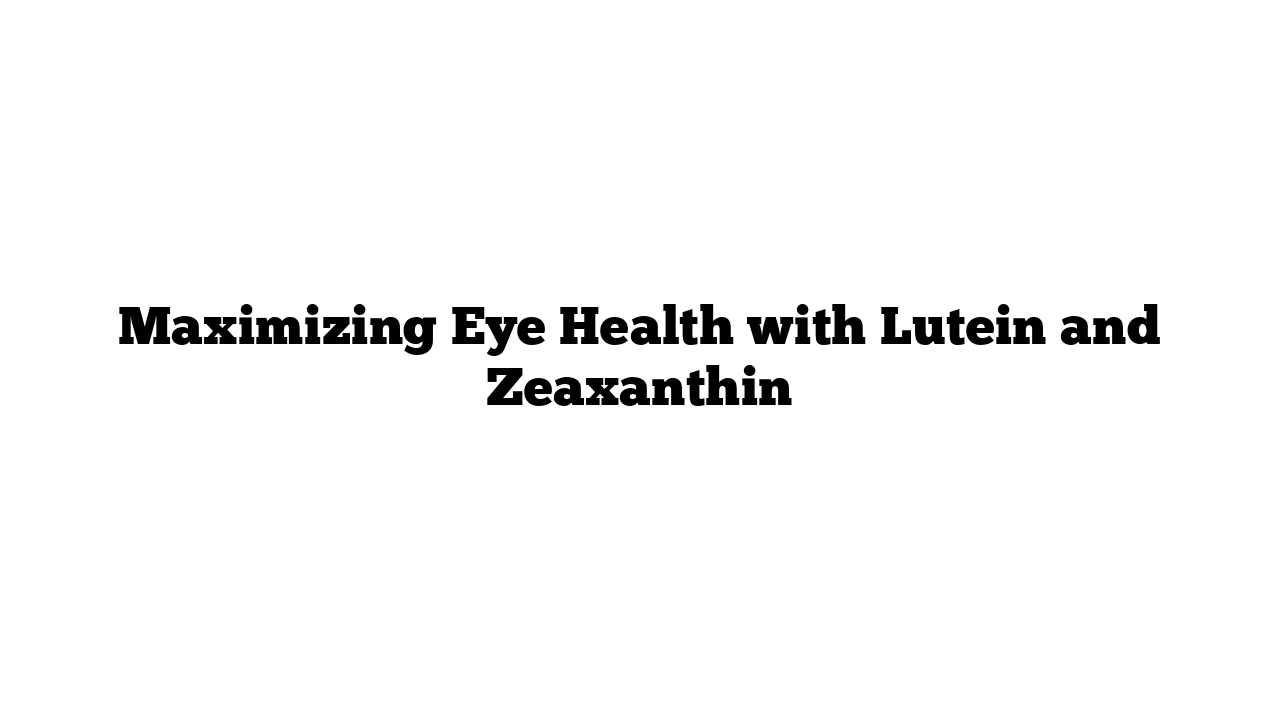When we think about health, we often focus on things like blood sugar, heart health, and avoiding diabetes or cardiovascular disease. However, one of the most vital parts of our body often gets overlooked: our eyes. Since you’re reading this, it’s likely that you’re already aware of how crucial your vision is. In this article, I want to discuss two potent molecules, lutein and zeaxanthin, which are believed to offer impressive benefits for eye health. Are these claims backed by science? Let’s dive into the fascinating details.
What Makes Lutein and Zeaxanthin Special?
Lutein and zeaxanthin are both carotenoids, which are pigments found in plants. What sets them apart from many other carotenoids is their specific distribution in the eye. While lutein is spread evenly across the retina, zeaxanthin is more concentrated in the macula, the central part of the retina responsible for sharp vision. This targeted accumulation makes them stand out because most carotenoids don’t accumulate in the eye at all.
These unique properties have garnered attention from scientists, focusing their research on these two molecules and their potential benefits for eye health.
How Lutein and Zeaxanthin Benefit Eye Cells
So, how do these molecules work once they enter the body? When you consume lutein and zeaxanthin—whether in supplements or through food—they travel to the eye, where they’re taken up by binding proteins that escort them into the cells. Once inside the cells, their chemical structure allows them to be exceptional at quenching reactive oxygen species (ROS), which are harmful molecules produced during processes like exposure to ultraviolet radiation.
What’s particularly fascinating is that lutein and zeaxanthin are not just floating around inside the cells. They target the cell membrane, where they integrate and recruit other antioxidant-binding proteins. This defensive mechanism helps prevent the buildup of ROS that could otherwise damage the eyes over time.
The Role of Macular Pigment Density (MPOD)
A common measure of eye health is macular pigment optical density (MPOD), which reflects the concentration of lutein and zeaxanthin in the macula. Higher MPOD scores are associated with better eye health and greater protection against damage. Studies consistently show that lutein and zeaxanthin supplementation can significantly increase MPOD, supporting their role in protecting the eyes.
Do Lutein and Zeaxanthin Improve Visual Function?
While MPOD is a useful proxy for eye health, many people wonder if consuming these carotenoids directly improves visual function. Some studies show that lutein and zeaxanthin can indeed improve visual acuity, contrast sensitivity, and detail perception. However, the results are mixed. Some tests show noticeable improvements, while others don’t show significant changes.
That being said, there was no evidence of worsening vision, which is still a positive outcome. The mixed results may reflect the fact that eye health is influenced by many factors, and carotenoids alone may not be a magic bullet for perfect vision. Still, any improvement is encouraging, especially given the natural protective mechanisms lutein and zeaxanthin provide.
Where Can You Get Lutein and Zeaxanthin?
Lutein and zeaxanthin are readily available in both supplements and whole foods. While supplementation can be more potent, studies show that whole food sources still offer significant benefits. If you’re looking to increase your intake, consider eating more dark leafy greens like kale and spinach, which are rich in these carotenoids. Other foods like green beans, squash, and zucchini also contain good amounts.
Interestingly, eggs also contain lutein, but in smaller amounts compared to plant-based sources—about 40 times less. However, the bioavailability of lutein from eggs is higher, meaning your body absorbs it more efficiently.
The Takeaway: Should You Include Lutein and Zeaxanthin in Your Routine?
If you’re serious about maintaining your eye health, lutein and zeaxanthin should definitely be part of your routine, whether through supplements or whole foods. The evidence strongly supports their role in protecting your eyes and possibly improving vision over time.
In conclusion, these two carotenoids are among the most potent tools for supporting your eye health, but, like all supplements, they work best as part of an overall healthy lifestyle. So, whether you choose to get them through food or supplements, your eyes will thank you for it!
Reference website:
For more insights into maintaining eye health, visit medicaltimes.io.
Top 10 Best FAQs:
- What are lutein and zeaxanthin?
- Lutein and zeaxanthin are carotenoids that accumulate in the eye and provide protection against harmful molecules.
- How do lutein and zeaxanthin benefit the eyes?
- They help quench reactive oxygen species (ROS) and protect eye cells from damage, improving overall eye health.
- What foods contain lutein and zeaxanthin?
- Dark leafy greens like kale and spinach, as well as green beans, squash, and zucchini.
- Can supplements be better than food sources?
- Yes, studies show that supplements are more potent than whole food sources, but whole foods still provide benefits.
- What is macular pigment optical density (MPOD)?
- MPOD measures the concentration of lutein and zeaxanthin in the macula, with higher levels indicating better eye health.
- Can lutein and zeaxanthin improve vision?
- While results are mixed, some studies show improvements in visual acuity and contrast sensitivity.
- How long does it take to see results from lutein and zeaxanthin supplementation?
- Most studies show noticeable improvements in 3 to 12 months.
- Can I get enough lutein and zeaxanthin from eggs?
- Eggs do contain lutein, but in much lower quantities than plant-based foods.
- Are there any risks in taking lutein and zeaxanthin supplements?
- Generally, these supplements are safe when taken as directed, but it’s always best to consult with a healthcare provider.
- Should I take lutein and zeaxanthin with other supplements?
- They can be taken alongside other supplements, but be mindful of overall dosage and balance.
